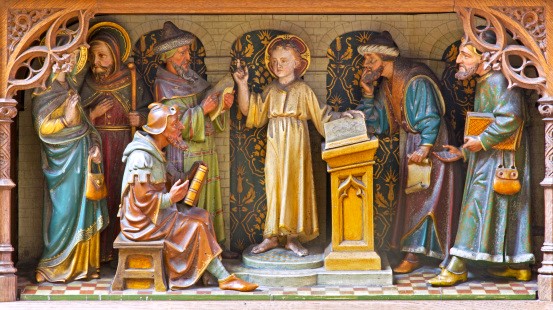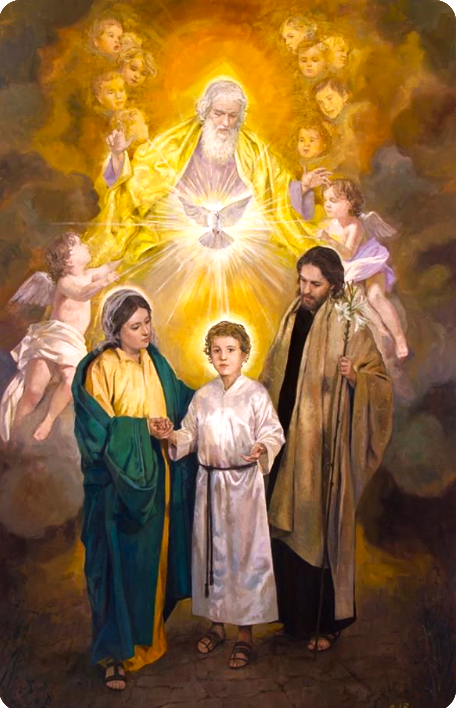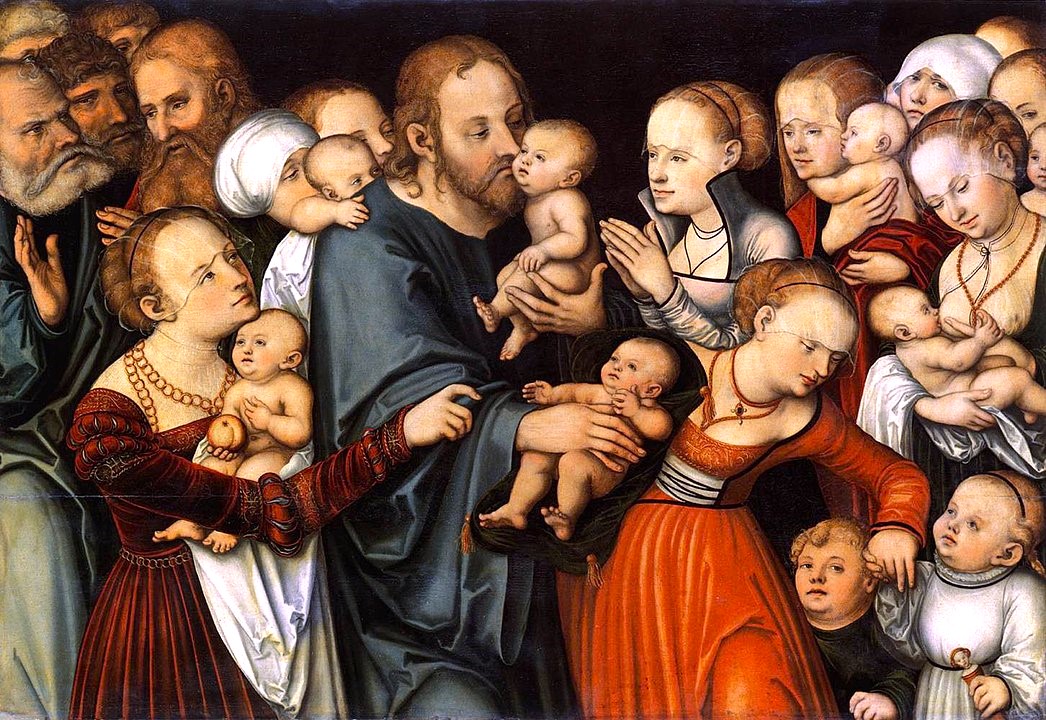Pinned Post ![]()

Boy Jesus Teaching in the Temple, Side Altar, Church Our Lady Across the Dijle.
Translation of the Epistle to the Colossians
Brethren, Put ye on therefore, as the elect of God, holy and beloved, the bowels of mercy, benignity, humility, modesty, patience: bearing with one another and forgiving one another: even as the Lord hath forgiven you, so do you also. But above all these things have charity, which is the bond of perfection: and let the peace of Christ rejoice in your hearts, wherein also you are called in one body: and be ye thankful. Let the word of Christ dwell in you abundantly, in all wisdom, teaching and admonishing one another in psalms, hymns and spiritual canticles, singing in grace in your hearts to God. All whatsoever you do in word or in work, do all in the name of the Lord Jesus Christ, giving thanks to God and the Father by Jesus Christ our Lord.
Translation of the Holy Gospel According to Luke
When Jesus was twelve years old, they going up into Jerusalem according to the custom of the feast, and having fulfilled the days, when they returned, the Child Jesus remained in Jerusalem, and His parents knew it not. And thinking that He was in the company, they came a day’s journey, and sought Him among their kinsfolk and acquaintances. And not finding Him, they returned into Jerusalem, seeking Him. And it came to pass that after three days they found Him in the Temple, sitting in the midst of the doctors, hearing them and asking them questions. And all that heard Him were astonished at His wisdom and His answers. And seeing Him they wondered. And His Mother said to Him: Son, why hast Thou done so to us? Behold Thy father and I have sought Thee sorrowing. And He said to them: how is it that you sought Me? Did you not know that I must be about My Father’s business? And they understood not the word that He spoke unto them. And he went down with them and came to Nazareth, and was subject to them. And His Mother kept all these words in her heart. And Jesus advanced in wisdom and age and grace with God and men.
The Saving Words of the Gospel.
In the name of the Father, the Son, the Holy Ghost. Amen
The early Church Fathers would see a connection between the various theophanies, which means a manifestation – it’s a revelation of the truth, it just imposes itself on us; the Epiphany, the Baptism of Our Lord, and the miracle at the wedding of Cana. These were all considered to be on the same day, not necessarily in the same year, but on the same day. And so they’re all united together as this single revelation of the Incarnate God.
Today’s mystery of the Holy Family is something of a theophany as well, a revelation of multiple things. Pope Benedict says, God wished to reveal Himself by being born in a human family, and hence the human family has become an Icon of God. The human family is, in a certain sense, the Icon of the Trinity because the love between its members and the fruitfulness of that love. Thus, God gave us the Holy Family, whom we honor today, who are like an earthly icon, a tangible image of the Divine Trinity. Each person in the family is distinct, and yet they are only one family, united in love that isn’t self-seeking or pleasure focused. And so, the mystery of the Holy Family points to this central mystery of our faith which is the Trinity.
St. Anselm when he describes the Trinity, he says that the Father is the mind that generates one thought. One thought and this one thought is perfect, it’s absolute, it’s complete, it contains Himself. It’s an image of Himself. So there’s a distinction between the mind and the thought, or the logos. Logos means mind, it can mean thought, it can mean concept, it can mean intelligibility, it means many things. If you have the Liddel Scott Greek Dictionary, you’ll find there about 12 pages of usages of that very charged term logos. And so, the logos then is generated by the mind. He is a perfect Image of the Father, lacking nothing. Lacking nothing in its imaging of the Father, so much so that even though it’s distinct from the mind, this concept this logos, this word, lacks nothing to be a Divine Person. And this generation of the Logos through the Divine Mind is not something that began in any time, it’s eternally happening. And so it’s active, it’s not static, and the Logos returns a love, facing the Father, the Father facing the Son and the love that They give, the outpouring of self between Them is so perfect, so absolute, it lacks nothing to be a Divine Person. That’s the Holy Spirit. That’s the Love that binds Them, as we heard St. Paul say. And so there’s, there’s no father without a child, there is no child without a parent and so these are relational terms. There was no time when the Father was not Father. There was no time when the Son, the Logos, was not Son. And so, this relationship then is eternal. It’s been elevated to something primordial. It’s not something that took place — there was no time when it wasn’t. And so, the Trinity is the first family, the first community.
And in a certain sense, the Holy Family makes the Trinity tangible for us. It makes the love of God palpable. We also see at the very beginning of Scripture, another family: When God creates Adam and presents him his bride Eve, Adam beholds several things in his bride: There’s a similarity because God has brought him all of these creatures, and none of them are a proper mate for him. And then He brings him one made of the same nature. So there’s a sameness but there’s a difference. And so this difference, speaks of complementarity, the complementariness of a man and a woman. And so it’s this otherness, then, that fascinates Adam, and God blesses them. So we see already a sacrament, we see this first marriage, in the very beginning of Sacred Scripture, and God gives them the mandate, Be fruitful and multiply. There is Logos, there is order, there’s hierarchy, there’s life, there’s growth.
Benedict again, says, God by having come into the world in the bosom of a family shows that the institution is a short way to meet and know Him, and the permanent call to work for the love and unity of all people. Now this unity of all people is not some nebulous idea like we might hear in Schiller’s Ode to Joy in the Ninth Symphony of Beethoven, which talks about, you know, basically, it is 72 and sunny and we’re all brothers and sisters. Well, it’s not a human endeavor. Okay. What Benedict is talking about, this unity of men is because of our ability to relate in a divine way, thanks to the Divine Presence in us; the Life of Grace, which is having the Blessed Trinity in our souls. And so, this is the only unity that really matters. It’s the only unity that lasts and is the only real unity that is a Divine operation, not a human endeavor.
He goes on to say, Thus, one of the greatest services which we as Christians can offer our fellow men and women is to show them the serene and solid witness of a family founded upon marriage between a man and a woman, defending it, and protecting it, because it is of supreme importance for the present and future of mankind. So defending that from what? Well from the original temptation in Eden: “You will be like gods. You will determine what is good and what is evil.” And so, this is what Benedict is warning us about: the dangers of the threats to the institution of the family, the attempts to redefine family.
Well, God’s Logos is shot through all creation. To deny the reality of the complementarity of a man and a woman and to try and redefine marriage is some sort of aberration, okay, this is trying to be like God. We decide what’s good, we decide what’s evil and we tell God, “Thanks for the input, but I’ll take it from here.” Well, that ends in disaster. And so it doesn’t matter what an activist judge decides, what people vote for, what the Supreme Court determines, no one can change Logos, no one can change the Truth. And so it is. And so our choice is to adequate ourselves to it or to rebel against it. Where there’s no complementarity there’s no family and if you don’t think there are just two sexes, go live on a farm for two weeks. Okay. You’ll get a lesson real fast that this complementarity is shot through all of existence.
If there’s no openness to life, there is no family. Be fruitful and multiply. So we see something in today’s Feast, something about the Trinity. We see something about the life of Christ, the Holy Family, we also see something about us, ourselves and the Church. In a certain sense, Mary is a symbol of the Church which longs for Christ without seeing Him. We await His Second Coming with longing, with desire, with sorrow, with patience with suffering. And when she finds Him in the Temple, that’s something like the greatest of all theophanies right, the Second Coming of our Lord, in which He returns to claim what is His saying, “Did you not know that I must be about my Father’s business, in the house of my Father?” And all along, we’ll see that He was working through the Church. He was present, working through the Church, through the sacraments, through souls in grace, who then become extensions of Christ in time.
And we have the Holy Sacrifice of the Mass as an anticipated actualization of His return. And especially in this time of Epiphany, we see a kind of a radiant projection into the present of Christ’s awaited Advent.
In the name of the Father, the Son, the Holy Ghost. Amen
— Fr. Ermatinger


